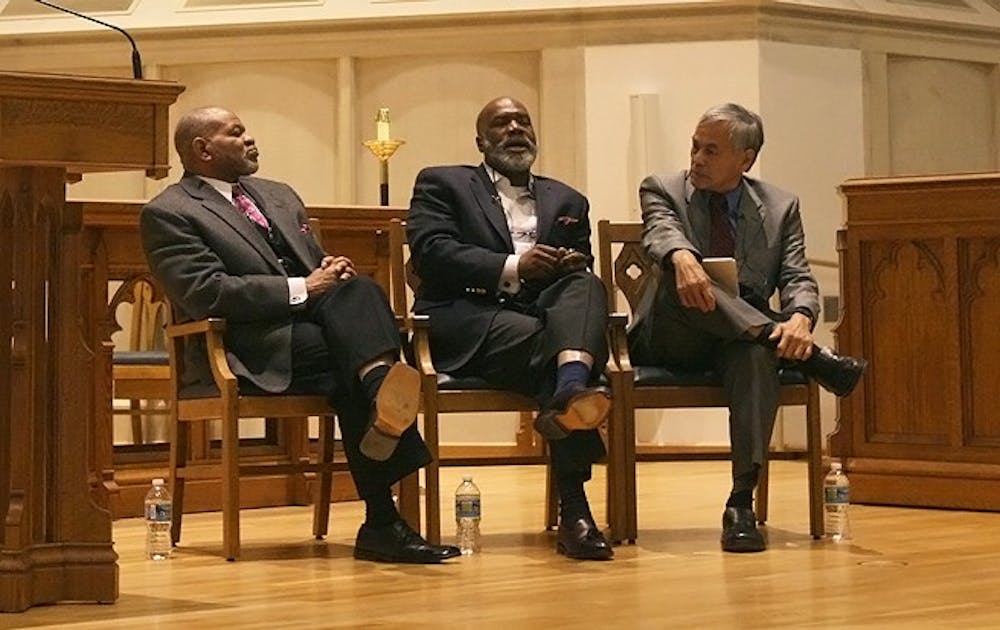Some individuals hope to bridge Muslim and Christian black churches through interfaith dialogue—a goal inspired by former Duke professor C. Eric Lincoln.
Three religious experts took part in a panel discussion Monday in memory of Lincoln. Organized by the Duke Faith Council, the panel was comprised of University of Southern California religion professor Sherman Jackson, Vassar College religious studies professor Lawrence Mamiya and Duke Divinity School professor William Turner, and the discussion was facilitated by Associate Dean for Religious Life Christy Lohr Sapp. The three men discussed the black and Muslim churches in America.
The event took place in Goodson Chapel as part of the ongoing commemoration of Duke’s 50 years of integration.
Duke Imam Abdul Waheed started off the event by giving a short speech describing the professor’s life.
Lincoln, who died in Durham in 2000, was known for his 1961 book “The Black Muslims in America,” in which he coined the phrase “Black Muslim,” Waheed said. He also described how Lincoln, who was a Christian, was “instrumental in helping America learn about Islam.”
Turner and Mamiya were both close personal acquaintances of Lincoln—Turner was a graduate student under Lincoln and Mamiya co-wrote a book, “The Black Church in the African American Experience,” with him. Both men reminisced about their experiences with the late professor.
Turner spoke about how Lincoln revolutionized scholarship on the black church by approaching subjects more empirically, whereas previous scholars had approached research with a preconceived notion of what worship should be like—viewing black churches as aberrations.
“Almost all of what existed regarding the black church was work that viewed the subjects as objects for inspection,” Turner said.
Mamiya spoke about his experience as a co-author with Lincoln and also about Lincoln’s friendship with civil rights activist Malcom X.
“All of Malcom X’s talks and lectures were engineered by C. Eric Lincoln behind the scenes,” Mamiya said.
Lincoln’s widow, Lucy Cook, spoke briefly about her late husband and her time as a graduate student at Duke. She also described attending church service at the Duke Chapel on Sunday and how Chapel Dean Luke Powery’s sermon “immediately transported” her 50 years back to a sermon held by famed civil rights activist Howard Thurman during his time as dean of the chapel at Boston University.
Jackson was the only member of the panel without a direct link to Duke or Lincoln, though he joked that he was wearing Duke blue for the event. He noted, however, that his own research was greatly based on the work of Lincoln and his contemporaries.
“They were thinking about both the present and the future of religion in the black community,” he said.
Jackson, who is Muslim, described the challenges facing black religious communities as not just racial and economic but, echoing Turner, “establishing their articulation of their religion” in the face of the notion that there is a “correct” way to worship—often the one practiced by those of another race.
Another major topic of the night was how to bridge the gap between the Muslim and Christian black churches. All the speakers noted how rare it was for interfaith dialogues to occur in anything outside an academic setting like the one at Duke.
“[Rev. Martin Luther King, Jr.] often mentioned that 11 a.m. on Sunday morning is the most segregated hour in America,” Mamiya said.
He added that only 7 percent of Christian churches are multiracial, but 90 percent of black and immigrant mosques are multiracial, according to a study he and a fellow professor recently conducted.
In a sobering note, Jackson spoke about how the Sept. 11 terrorist attack had the side effect of bringing together the black and immigrant Muslim communities that suffered racism and Islamophobia in the wake of the incident.
Mamiya said he believed that the best way to bring together the two communities was for them to tackle a common problem afflicting the black community such as mass incarceration in America.
“Using the word ‘criminal’ is a way of legally discriminating against someone,” he said. “You can deny them employment, you can deny them housing, [and] they have restricted voting rights.”
He added that the mass incarceration rate disproportionately affects black and Latino communities.
“There is a need for a new civil rights movement.” Mamiya said, noting his experience with activism as a member of the 1960s civil rights movement.
For many of the event’s attendees, interfaith dialogue was also created through the necessity of family. Speaking from the audience, a man described how different members of his family were either devoutly Muslim or Christian and had learned to coexist. Durham resident Beatrice Mohammed had a similar experience.
“Having come out of the church, I’ve always experienced a very good relationship with the church,” Mohammed said.” Most of my relatives are Christians, so there’s always that interfaith. My mom didn’t particularly like my conversion to Islam, but we have very interesting dialogue between Islam and Christianity.”
Get The Chronicle straight to your inbox
Signup for our weekly newsletter. Cancel at any time.

